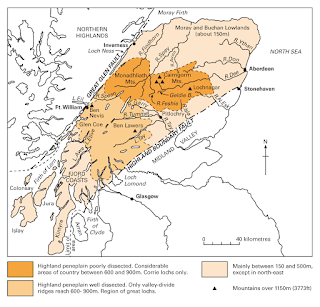I read The Marches: A Borderland Journey between England and Scotland by Rory Stewart as part of my Reading Northumberland project.
For the most part, I really enjoyed it. Stewart, a UK politician who was an MP during the writing of the book, details two long-distance walks. The first is an East-to-West trek along the Hadrian's Wall Path while his 93-year-old father meets him at various points along the path for a meal or chat. The second is a much longer trek from his cottage in the Lake District to his father's house in Scotland. The third section of the book involves his father's death and funeral.
In the course of all three sections, Stewart talks about his and his father's careers, in the UK and abroad, politically and militarily, in the case of his father. He also delves into the history of the region, and discusses the socio-political forces at work over time, from the point of view of his own Conservative political stance.
I enjoyed the middle section the most. I was a bit annoyed during the Hadrian's Wall section because I wanted to hear more about the Wall and the walk and the environment, but he kept on veering off into his time in Afghanistan or his father's time in Malaysia and other foreign posts or his childhood or his education. Not that that wasn't interesting, but it wasn't why I was reading the book.
The middle section, however, was a more cohesive narrative that included the history, geography, ecology, and philosophical musings about the nature of borders and boundaries, natural and political. I learned a lot and appreciated Stewart's descriptions of the landscape and villages and farms and cities as well as the farmers, laborers, and others he encountered.
I think the single most interesting thing I learned was about the Highland Boundary Line, the geological demarcation between the Highlands and Lowlands of Scotland.
Just beyond my father's fences, and the suburbs of Crieff, lay the starkest geological division in Britain. Four hundred million years ago, two continents--once 4,500 miles apart--had collided. A little later, two further plates had struck, slipped, and sheared, driving tight ripples diagonally across Scotland. The older schists and slates of rock to the north-west rose to form the Grampian Mountains. This chain--200 million years older than anything in southern Scotland or England--was the beginning of the Highlands. At its foot to the south was the rift valley of red sandstone, once an ocean, in which our fields stood--a separate geology that stretched a hundred miles long and fifty miles south, forming a separate culture.
 |
| Here's a map that shows the location of the Highland Boundary Fault. |
I found the last section heavy going, and ended up skimming the very end.
I really enjoy travel books and trekking stories, and those parts of The Marches were quite good. However, the entire book read like a politician's position paper that would vault him onto the next stage of his career. Not to mention that politically I'm not very sympathetic to the Conservative cause as a general rule.
So, a mixed reaction. I read the book wanting to get something different from what the author wanted to give. Sometimes that happens.
Next up in non-fiction is The Steel Bonnets: The Story of the Anglo-Scottish Border Reivers, by George MacDonald Fraser. I'm also reading Medicus, another Roman Britain fiction, and have a few both fiction books on deck.


I've just lost my comment on your post! Here goes with a second attempt. Rory Stewart is still an MP - for the western side of the Borders - I live at the eastern end. The Marches looks an interesting book, I'll look out for it. I've read The Steel bonnets - it's heavy going in parts! I hope you like it.
ReplyDeleteHow interesting!! I love reading about Scotland, and though I'm not sure I'd venture into this one you've reviewed here, I am purely fascinated about the Highland Boundary Line. I've heard of it before, but never knew all this info that I gleaned from your paragraph about it. THANK YOU FOR SHARING!!
ReplyDeleteSounds like too much politics and not enough about the Wall! But the Highlands part is interesting. I'd like to go there. When is your trip? this summer?
ReplyDeleteThis is such a good post despite the books shortcomings.
ReplyDeleteI like walking/travelogues of this sort. I also tend to be fine when such books veer off into different subjects such as other time periods in the author's life. However, the political stuff sounds like it might be too heavy handed in this book.